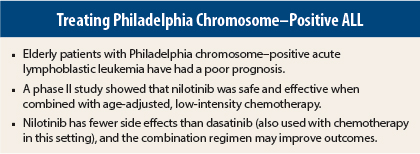The addition of the tyrosine kinase inhibitor nilotinib (Tasigna) to standard low-intensity chemotherapy improved outcomes in elderly patients with newly diagnosed Philadelphia chromosome–positive acute lymphoblastic leukemia (ALL) and may represent a new approach to this group of patients, who are known to have a poor prognosis.
“Our study showed that nilotinib combined with age-adapted, low-intensity chemotherapy is highly effective for elderly [Philadelphia chromosome–positive] ALL patients. At 2 years, overall survival was 72.7% without stem cell transplant. A high rate of molecular response was achieved, and this increased over time,” said study author Oliver G. Ottmann, MD, of Johann Wolfgang Goethe University, Frankfurt, Germany.
“Our study strongly supports adding nilotinib to standard chemotherapy to help elderly ALL patients achieve remission without significant toxicity. We hope that further study will confirm this drug’s positive effect in elderly [Philadelphia chromosome–positive] ALL and lead to its eventual approval in this setting,” Dr. Ottmann stated.
The combination of chemotherapy and tyrosine kinase inhibition is now the gold standard for treatment of Philadelphia chromosome–positive ALL. However, despite the use of a tyrosine kinase inhibitor, elderly patients not eligible for transplant still have a poor outcome.
Study Details
The European Working Group in ALL (EWALL) developed an age-adapted, low-intensity chemotherapy backbone for Philadelphia chromosome–positive ALL patients aged 55 and older. At the 56th American Society of Hematology (ASH) Annual Meeting and Exposition, Dr. Ottmann reported results of a phase II trial designed to evaluate the second-generation tyrosine kinase inhibitor nilotinib in combination with the EWALL low-intensity chemotherapy backbone.1
“We had little prior experience with nilotinib in these patients,” Dr. Ottmann said.
The low-intensity chemotherapy regimen follows: patients were pretreated with dexamethasone and optional cyclophosphamide, and nilotinib was given with induction therapy and continued thereafter. During induction therapy, nilotinib was combined with weekly vincristine. Consolidation therapy consisted of nilotinib, methotrexate, and asparaginase (Elspar) for cycles 1, 3, and 5 and cytarabine for cycles 2, 4, and 6. Maintenance therapy consisted of continued nilotinib, mercaptopurine daily, and methotrexate weekly over 1 month every other month and dexamethasone with vincristine given in 2-month intervals for up to 24 months of treatment.
The study enrolled 56 newly diagnosed patients, with a median age of 65 years (range, 55–85 years); 12 of these patients were aged 70 or older. None had central nervous system involvement.
Interim Analysis
In an interim analysis of 47 patients evaluable for efficacy, complete hematologic response was achieved in 41 (87%). There was a low incidence of failure (two patients, 4%). Three patients were excluded from the analysis due to early treatment discontinuation.
The median time to response was 6 weeks. At a median follow-up of 8.5 months, which Dr. Ottmann noted was short, the regimen was highly effective, with few relapses. In patients who did not go on to stem cell transplant, the median overall survival at 2 years was 72.7%; in all patients, the median overall survival at 2 years was 67.1%.
The investigators looked at minimal residual disease after induction therapy. Major molecular response was 45.5% after induction therapy and 79% during consolidation therapy. The minimal residual disease–negative status increased over time. After induction therapy, only 1.4% tested negative for minimal residual disease; during consolidation therapy, 26% tested negative for minimal residual disease.
In the study, 20% of patients underwent stem cell transplant. “This is evolving as a therapeutic option, even among elderly patients with [Philadelphia chromosome–positive] ALL,” Dr. Ottmann said. ■
Disclosure: Dr. Ottmann has received honoraria as well as research funding from and has served as a consultant for Novartis.
Reference
1. Ottmann OG, Pfeifer H, Cayuela J-M, et al: Nilotinib (Tasigna®) and chemotherapy for first-line treatment in elderly patients with de novo Philadelphia chromosome/BCR-ABL1 positive acute lymphoblastic leukemia: A trial of the European Working Group for Adult ALL (EWALL-PH-02). 2014 ASH Annual Meeting. Abstract 798. Presented December 9, 2014.



